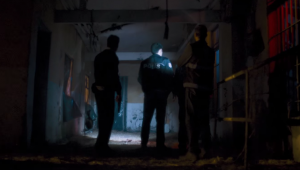
Hell is not pleasant. It’s a repetitive stream of agony and torment, both physically and mentally. It is grim, disturbing, and unrelenting. No one aspect of it is enjoyable, nor should its representation of it be so. To be disturbed by Can Evrenol’s depiction of Hell in “Baskin” is the correct response. To criticize it for being too grotesque would be nonsensical. To play it safe would be a grave discredit.
The question presents itself, why one would endure a film such as “Baskin” if it isn’t pleasant nor entertaining (in the traditional sense). To do so would be to experience the true meaning of horror: to be scared. I think back to my Catholic upbringing, where Hell would be described as the worst torment imaginable. Hellfire and brimstone, demons punishing sinners ad nauseam, Lucifer himself reveling in the torture. These visions were ingrained into our heads to instill fear, to keep us on the straight and narrow. To partake in sin would be to accept one’s fate of eternal anguish. As Baba (Mehmet Cerrahoglu), the devil incarnate in “Baskin,” states, “Hell is not a place you go. You carry Hell with you at all times.”

If those priests instilling fear in a younger me wanted to show a film to keep me on the straight and narrow, “Baskin” would be it. It’s as haunting as their stories, even more so. Evrenol cuts out the hellfire and brimstone, keeps the demons in the form of S&M slaves, and cranks up Lucifer’s torment. The sinners in question go through unspeakable torture, from grisly disembowelments, dully slit throats, and disturbing rape in the twisted fantasy of bestiality, to name a few. It is not for the faint of heart, even making myself queasy. Tis the point.
Hell itself is found via a portal in an abandoned mansion. It is reminiscent of a torture chamber, rooms filled with nothing but chains and torture devices. Hallways are littered with rats, frogs, spiders, and asbestos. Blood is splattered everywhere, drenching the slavish demons partaking in distressing intercourse in the corner. As one travails through Hell, their senses become disarrayed; hope slowly slipping away.

For five Turkish police officers, hope is all they have left. Answering a routine call and getting stranded in the middle of nowhere, they happen upon the abandoned mansion of doom. Arda (Gorkem Kasal), the youngest and most naïve of them all, had nightmarish premonitions of this place dating all the way back to his early youth. Just the night before the visions came to him, acting as a warning. If only he had heeded them. Along with his partners, Arda is sucked into a world of pure misery, one that messes with the mind and body.
The setup is routine, but the execution is not. Evrenol messes with the viewer’s sense of reality, pulling away from Hell and returning to the diner we met the officers in. It was in this diner they regaled one another in sophomoric stories of misspent youth, joking about losing their virginities to various animals (I’d rather not imagine how the elephant scenario played out). This would come back to haunt them later via the aforementioned rape. All of their sins, from macho bravado to sloth, play into their torture later on.

How does Evrenol get back to the diner? By psyching out the audience via dream sequences. On numerous occasions, he pulls the curtain back, revealing the nightmarish visions of Hell were just that: nightmares. Arda jerks back in his seat, then reports his visions to his superior. Said superior waxes religiously about the visions, only for them and the audience to be whisked back to Hell. Baba is messing with his victims.
While this may seem like a cheap trick, and it admittedly is, it’s conveyed in such a clever way. It complements the tone of Hell on display, one of agony and deceit. It’s one thing to maim and torture a sinner; it’s another to make him question his own sanity. Even if Arda were to escape, he’s mentally been defeated. One begins to wonder if it is the workings of Baba triggering the flashbacks or if Arda is suffering from PTSD. Either way, it’s perturbing!

Evrenol has a hard task of getting “Baskin” to a sufficient finale, stumbling along the way. A sordid (and slightly asinine) twist keeps the proceedings from falling into ho-hum trappings, but there’s no denying it’s a bit of a letdown. Is there any way for this film’s ending to not be slightly underwhelming? After going through Hell, any finish would seem like a comforting release. That may be the message, though: that death is a comforting release if one is to ascend to Heaven. If one is trapped for eternity in Hell, there is no satisfactory finish.
The journey to Hell and the escape from it may be of the clichéd variety, but Hell itself is anything but. It may harken to Clive Barker’s vision of Hell in “Hellraiser,” and the visceral nature may remind me of Rob Zombie’s “31,” but the unrelenting direction is a beast all to its own.

To answer the question of why one would endure such an unpleasant film: it’s to tap into that desire for fear. We settle for safe horror films to trigger this, that way we can ease back into happiness smoothly. With “Baskin,” there is no safety. This is as dangerous as it gets.
Final Rating: A-
